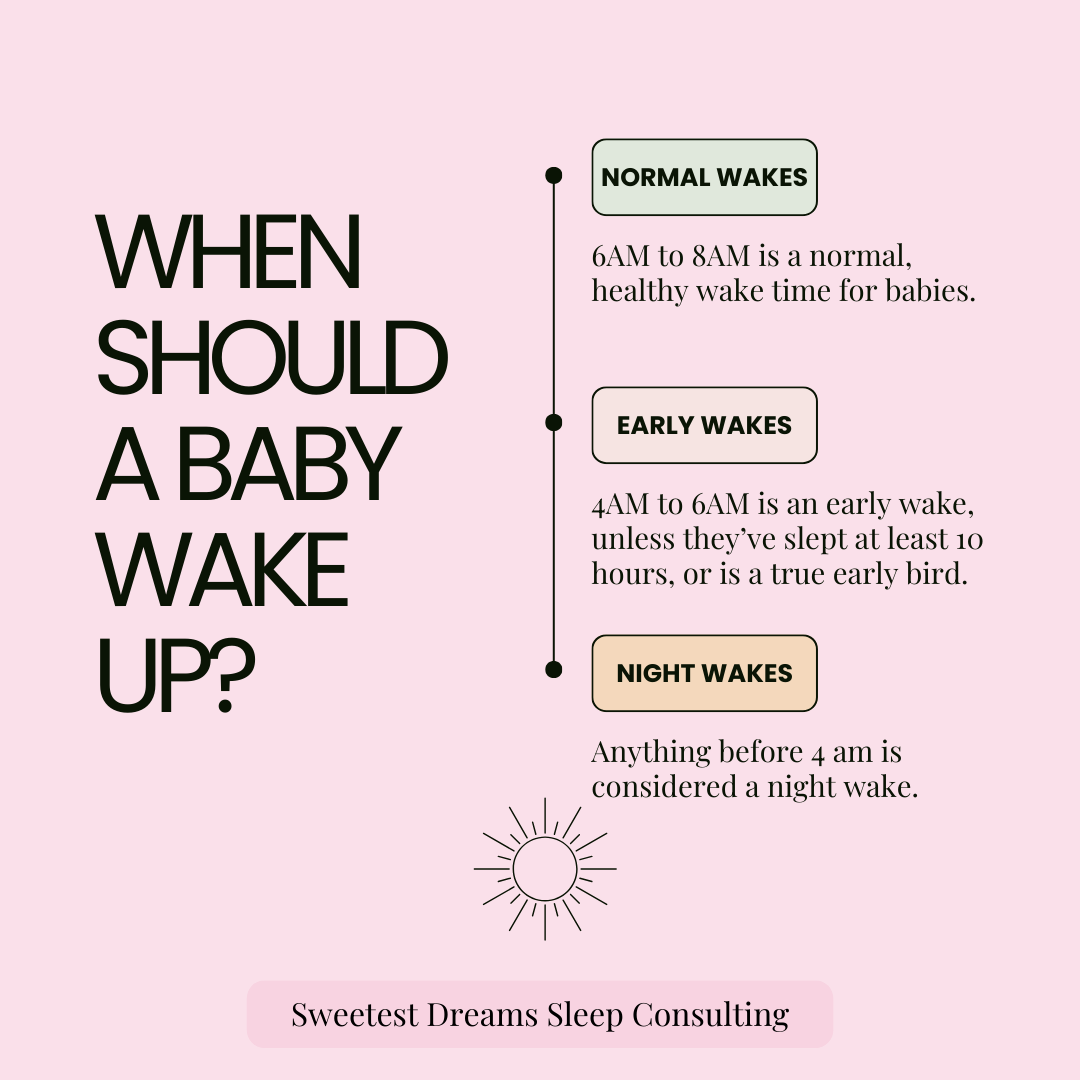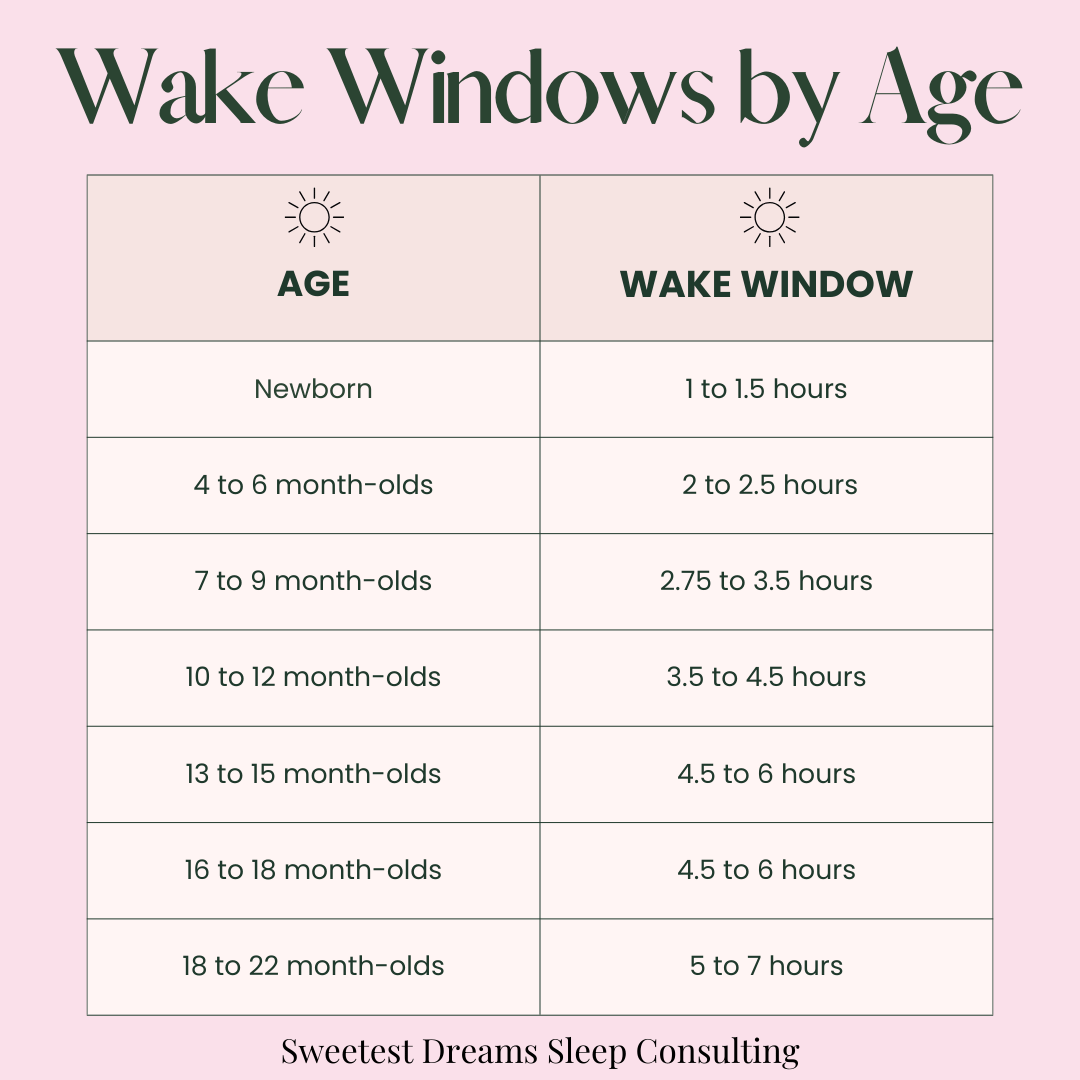Baby Waking Up Early? Here’s Why and How to Get Baby to Sleep In
Early wakes can be as frustrating and exhausting for babies as it is for parent. Especially if the baby already isn’t getting enough sleep and really needs those extra couple hours.
We’ll go over the most common reasons babies wake early. Once you identify the issue, be consistent in addressing it, and know that it may take time to fully resolve.
What is “Normal”
After the newborn period, wake times fall into a three categories:
Normal Wake Time: 6AM to 8AM is a healthy wake time for a baby.
Early Wake Time: 4AM to 6AM is considered an early wake, with caveats:
If your baby has slept at least 10 hours, they may be ready for the day. If you put them to bed later without luck, it’s likely one of the reasons below.
Some babies are true early birds (their natural clock thrives on rising early). Early birds are consistently happy and energetic when they wake up. If your baby is cranky upon waking and fussy throughout the day, they’re probably not an early bird and aren’t getting enough sleep because of one of the reasons below.
Night Wakes: Anything before 4AM should be treated like a night wake.
Why Babies Wake Early (and to fix it)
At about 4 months, babies start to cycle through more sleep stages like adults, with partial or full wakes between cycles. These wakes serve a survival function for humans, to rouse us enough to readjust our body and check our surroundings. If all is well, we go back to sleep without much fuss, and usually don’t even remember waking.
We spend more time in deep sleep stages during the first part of the night, and more time in light sleep and REM stages as the night goes on. This means it’s easier to be woken and harder to fall back asleep in the early morning hours. The following are the most common sleep disturbances that can wake a baby during this time.
Approximate example of how we move through the 5 sleep stages throughout the night.
They’re Too Hot or Too Cold
Feel the back of their neck. If that area is warm and sweaty or cool to the touch, they’re likely too hot or too cool to sleep comfortably once their sleep pressure is wearing off in the early morning. Try adjusting the room temperature and dress them in different sleep clothes to regulate their temperature accordingly.
There’s Too Much Light
Light signals to the brain and body to stop producing melatonin and prepare to wake up. If there’s too much light in your baby’s room when their sleep cycles are naturally lighter, their body will think it’s time to be awake. Avoid night lights and put up black out curtains to block out as much outside light as possible.
Outside Noise
Neighbors leaving for work, dogs barking, morning birds outside the window…all these things can wake a baby up early. A pediatrician-approved white noise machine can help block out sounds outside of the room and home.
Poor Sleep Schedule
This one is tricky to diagnose and resolve, but it’s very common. Some prefer following babies’ sleep cues without paying attention to wake windows, and it works for some families. But after the newborn period, sleep cues are unreliable. Other things — like boredom, hunger, and allergies — can easily be mistaken for sleepy cues. If you’re struggling with your baby’s sleep, it’s a good idea to keep a more age-specific schedule.
Babies need good sleep to get good sleep. If they don’t nap well, it’s harder to sleep well at night, and vice versa. And if they nap too much, they won't have enough sleep pressure to sleep in.
Your baby needs an age-appropriate amount of sleep in a 24 hour period. To get 11-12 hours of night sleep, the rest of the 24 hour sleep quota for their age should be split between naps. Keep wake windows consistent, work on indendent sleep skills (more on that in next step), and avoid letting them oversleep naps.
They Don’t Have Independent Sleep Skills
If your baby is fully dependent on you for sleep, they’ll also need you when they wake between sleep cycles. Even with your help, they may not be able to get back to sleep in the early morning hours because sleep stages are already so light then.
Knowing how to fall asleep on their own helps your baby move between sleep cycles rather than waking fully to signal for help. There are responsive, compassionate ways to teach independent sleep skills that don’t involve leaving your baby to cry alone for hours. If you want guidance on the best method for your baby’s age, temperament, sleep setup, and your family sleep goals, check out my custom sleep packages.
They’re Used to Waking Up Early
If your little one has been waking early, their sleep clock will naturally be set to an early hour. They may not want to be up either, like when you wake on the weekend without an alarm clock, purely out of habit.
Work on resolving other factors that are contributing to poor sleep, including schedule, environment, and independent sleep skills, and the habit will begin to resolve.
Summary
Dress your baby in sleep clothes that are appropriate for the season, and make sure it’s a comfortable temperature in the room.
Make your baby’s room as dark as possible with blackout curtains or panels.
Use a pediatrician-approved white noise machine to block outside noise.
Create an age-appropriate schedule, being consistent with wake windows and naps.
Use a responsive method for teaching independent sleep skills that suits your baby’s temperament.
Patience and consistency are key when it comes to resolving early wakes. Be diligent in solving the root causes, and give your baby time to adjust. You may need to go to bed earlier for awhile so you can be rested and ready for the day when your baby gets up.






